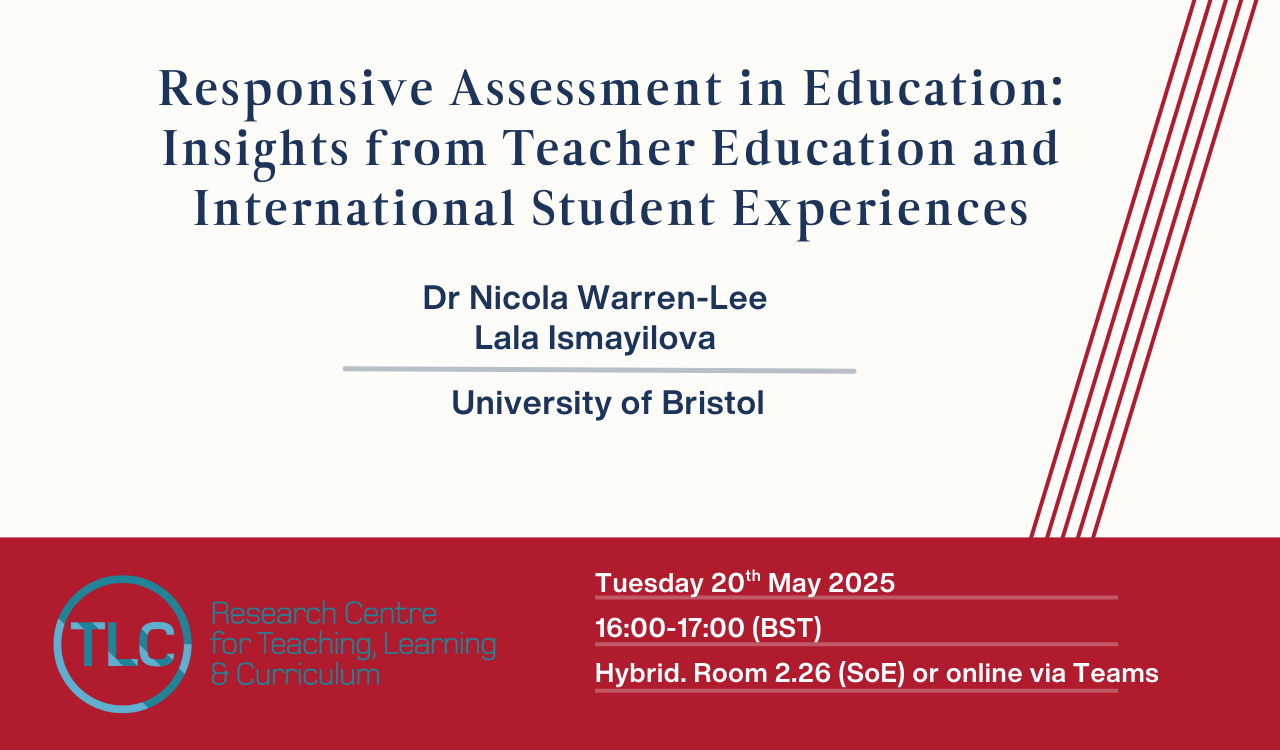20 May 2025, 4.00 PM - 20 May 2025, 5.00 PM
Dr Nicola Warren Lee and Lala Ismayilova
Hybrid

Event information
Responsive Assessment in Education: Insights from Teacher Education and International Student Experiences
Tuesday 20th May 2025, 16:00-17:00 (BST)
Venue – Hybrid. Either in person at the School of Education in room 2.26, or online via Teams.
Registration - Please email Andrew Carr or Simon Brownhill for information on how to attend.
About the event
This event is part of the Centre for Teaching, Learning and Curriculum's Seminar Series for summer 2025, taking place across teaching block 3.
Host: Centre for Teaching, Learning and Curriculum (TLC)
Speaker: Dr Nicola Warren-Lee (Senior Lecturer, University of Bristol) and Lala Ismayilova (PGR/Graduate Teacher, University of Bristol).
Abstract (NWL): Developing assessments that foster learning
This presentation will draw upon the philosophical work of Robert Brandom (1994; 2000) and Jan Derry (2000; 2008), commonly known as inferentialism. ‘Key to inferentialism is the privileging of the inferential over the representational/referential in an account of meaning’ (Derry, 2017, p.403). This is to say our linguistic expressions and thoughts depend for their meaning on the system of inferences within which they are disclosed rather than the referential relations they bear to things in the world (objects, events, states of affairs, experience, or whatever they represent). The potential of an inferential approach to initial teacher education (ITE) assessment will be considered.
The first idea to be discussed will be the conceptual potential of the unarticulated experience that student teachers bring to formal learning and assessment situations (Edwards, 2017, p.33). From an inferential perspective, ‘conceptual capacities are already operative in experience and account for the content of experience, though they are not necessarily acted on’ (Derry, 2013, p.225). The second idea is the space of reasons. As Brandom (1995, p.5) emphasises, ‘we live and move and have our being in the space of reasons’. It is essentially a space of social articulation that is an embedded part of our life. It reconstitutes a conception of knowledge that not only recognises its social cognitive basis, but also its normative nature (relating to an evaluative standard). How these ideas could be applied to formal assessment experiences on the Post Graduate Certificate in Education (PGCE) will be offered.
Abstract (LI): Cultivating Academic Outcomes: International Master’s Students’ Perceptions of Formative Feedback in UK Higher Education (title)
Formative feedback is recognised as a powerful driver of student learning (Black & Wiliam, 1998), yet its effectiveness depends on how it is received, interpreted, and used by students. Drawing on Vygotsky’s (1978) socio-cultural theory and Wiliam and Thompson’s (2008) framework of formative assessment, this qualitative study explores international master’s students’ perceptions of formative feedback in UK higher education. Semi-structured interviews with 12 students from diverse backgrounds reveal how formative feedback is often initially misunderstood, especially by students unfamiliar with feedback-focused academic cultures. Over time, however, students come to recognise its value, particularly when supported by clear, timely, and actionable comments. Findings highlight the key role of peer interactions, tutor guidance, and the need for culturally responsive feedback practices. The study also discusses challenges such as time constraints, language barriers, and the emotional impact of feedback. Recommendations are offered to improve formative feedback practices to better support international students’ learning and academic achievement.
